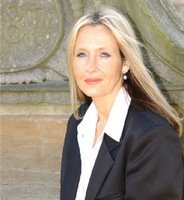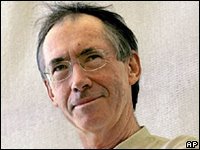
The Scottish Arts community lost a legend last week after Richard Horne and his wife, Mandy, were found dead on Shetland. It appears Harry assisted Mandy's suicide, a sufferer of terminal chronic multiple sclerosis, then killed himself. They were both found on Wednesday 10th January, 2006 at 10am.
Mr Horne was an award-winning writer and political cartoonist, who worked under the name Harry Horse. Colleagues said they were a wonderful couple, and his agent, Caroline Sheldon, added: "I represented the brilliant Harry Horse for 15 years as his literary agent and a friend. He was a genius both in words and illustrations.”
Who was He?Many authors choose to use pseudonyms, and the ways they come up with these names vary from the imaginative to the simply outrageous. Richard Horne’s story lies somewhere in between. He decided on his authorial name when a school teacher misread his father's handwriting on the school register, but quite where ‘Harry’ came from will probably never now be known.
On December 27, 1977, when aged only 17, he abandoned his native Warwickshire on the toss of a coin. Heads it was Edinburgh, tails it was London. "I'm glad it was Edinburgh," he recalled many years later in an interview with The Glasgow Herald, "because it was smaller. I would have been terrified in London, completely naive."
Yet Harry always retained a sense of the naïve; it’s what his friends and colleagues seemed to love about him most. His sense of innocent wonder, bewildered outrage, and un-ending amazement at the world around him, was a joy to behold.
His outlook on life was also expressed through his fashion style. Often dressed in long black trench-coat, Napoleonic hat, and biker-style boots, he looked a dominating character, yet his soft eyes and larger-than-life build, betrayed him as a warm and approachable person in every sense.
First BookIn 1983 Harry wrote his first book; he was 23. The Ogopogo: My Journey With The Loch Ness Monster, which was entirely written and drawn by himself, was met with poor sales initially but went on to become the first children's book to win the Scottish Arts Council Award.
By 1990 he had joined a band called Swamptrash as lead singer, which he felt was never given due respect by the Scottish press. His wife, Mandy, was their No 1 fan, and while attending a meeting with Andrew Jaspan, then the editor of the Scotland on Sunday newspaper, Harry produced a sketch book full of his drawings. So impressed was Jaspan, he was soon appointed the paper’s political cartoonist.
He delighted in lampooning the Tory party. "I still have a cartoon of John Major posed as a ridiculous Imperial Leader," says Jaspan. Harry loved to reverse the psychology of the Scotland, England make-up, often portraying Scotland as the dominant big brother.
CanongateHarry's career took off in several directions in the early nineties. Swamptrash did not last long but proved to be very influential for him. Increasingly though, he was in demand as a children's author and illustrator.
His first employer was Stephanie Wolfe-Murray of Edinburgh publisher Canongate. In 1981 Harry illustrated Magus The Lollipop Man by Michael Mullen, his first assignment.
Over the next few years Harry moved on to other publishers, but continued to work on ad-hoc projects with Canongate. "One day he came into the office, rubbing his hands with glee," recalls Wolfe-Murray. "He had sold a long lost diary to an antique dealer for a lot of money, probably about £25, I really can't remember. He claimed that he had stolen it from his parents' library and every now and again he would be prepared to take another. And he did, or so the hapless antique dealer believed. This went on for several weeks. Harry sweated over the creation of these diaries, soaking the pages in tea and heating them in the oven to give them an ancient appearance. They were works of art, filled with tiny delicate writing and wonderful little pencil drawings. Unfortunately one of my colleagues at Canongate spilled the beans to the antique dealer which put a stop to it. Now they will be collectors' items. The diarist's name was an anagram of Harry's real name, Richard Horne."
RooHarry will be best remembered for his children's books and, in particular, those featuring Roo, "a dog of unknown breed and age", who Mandy and he rescued from Portobello Dog and Cat Home in 1990. When she died in May 2006, Harry emailed all of his friends: "Just a line to let you know that Roo has passed away from this life to the next. She did not suffer, but died in my arms on her favourite place, the beach at Meal in Burra. She is buried at Kullade and a simple headstone marks the place."
Darkness
By now, Mandy, not yet 40, was gravely ill from multiple sclerosis and was confined to a wheelchair. "I spend most of my days in the kitchen rather than the studio," Harry wrote. "I have a considerable number of teabags at my disposal."
He was often in despair. "I get the black dog," he once told Vicky Allan of The Sunday Herald. "If I don't draw, then I get depressed. So it is therapy." There was a lot in the world that affected him: war, global warming, consumerism, cruelty to animals, political correctness, unappreciativeness of artists and writers.
Towards the end his cartoons became increasingly dark and he was offered ridiculously low sums of money for thousands of copies of his books. The Last Polar Bears is rumoured to have sold over a million copies, yet he received next to nothing. If true, it is a sad injustice to the wonderful man who was Harry Horse.
 Scottish author, JK Rowling, came second in a survey to establish the The 20 Richest Women in Entertainment. According to Forbes Magazine, Rowling is now worth £507m ($1bn), second only to Oprah Winfrey with an estimated fortune of £700m ($1.5bn).
Scottish author, JK Rowling, came second in a survey to establish the The 20 Richest Women in Entertainment. According to Forbes Magazine, Rowling is now worth £507m ($1bn), second only to Oprah Winfrey with an estimated fortune of £700m ($1.5bn).



